.webp)
During @TOKEN2049 week in Singapore, House of ZK hosted Verifying Intelligence in partnership with @boundless_xyz and @GoogleCloud - a full-day convergence of cryptography, computation, and machine learning. The event, hosted by @alicelingl, examined a growing question shaping both industries: if artificial intelligence is to guide decision-making in sectors like finance, governance, healthcare, and defense, how can its reasoning be trusted? And if blockchain is to secure that intelligence, how can its guarantees extend beyond transactions to cognition itself?
This was the foundation for a day divided into three tracks - AI, ZK, and ZK + AI - each exploring how verifiability becomes the shared language of trust between autonomous systems.
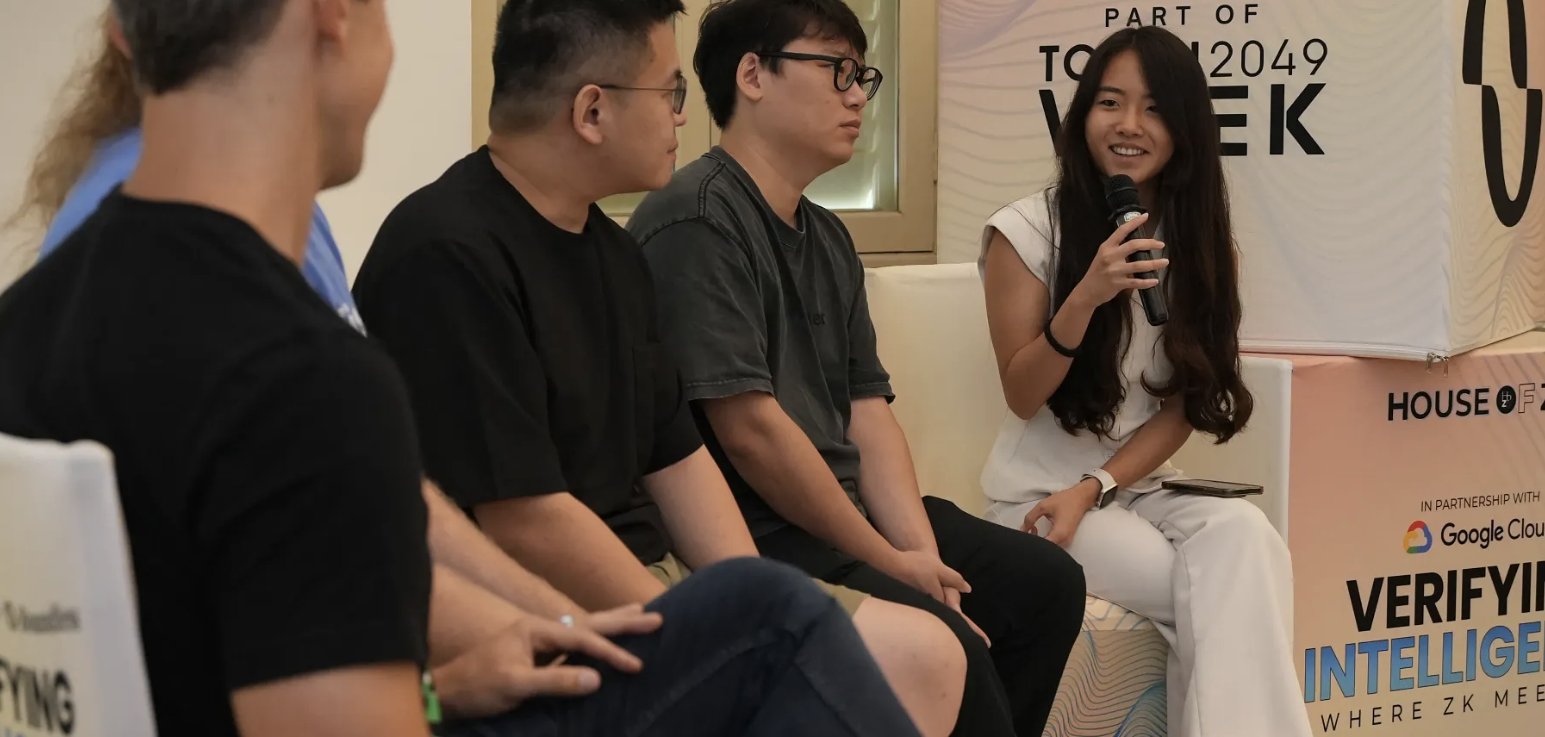
Subho Banerjee, Head of Web3 Customer Engineering at Google Cloud, opened with a panoramic view of the state of zero-knowledge proofs. He outlined how the same mathematical primitives that secured early blockchains are now being adapted to protect the logic of AI models. In his words, the fusion of “cloud-scale compute and verifiable computation” marks the next architectural shift: ZK becoming a general-purpose trust layer for machine systems, not only financial ones.
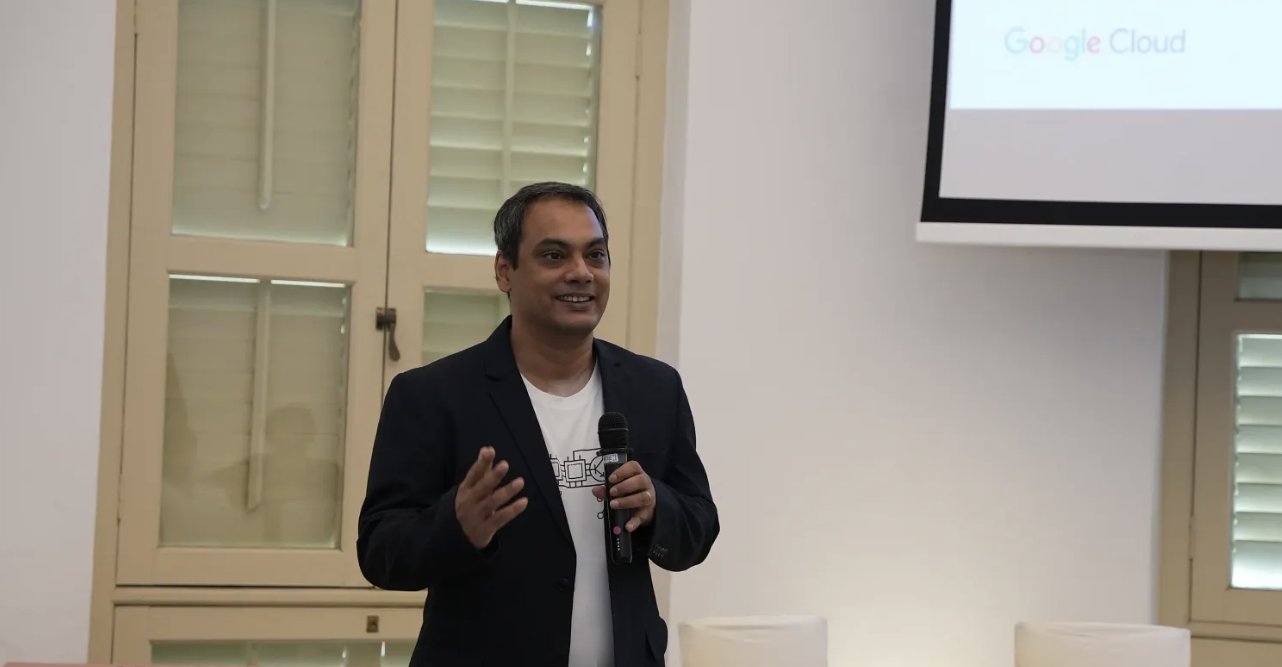
The morning began with a panel moderated by @provenauthority, CEO of @billions_ntwk, titled From Models to Agents: The Next Stage of AI Autonomy.
@tomngodefi (CEO @MetisL2), @BrianNovell (BD Lead @lagrangedev), @vargs_g (BD Lead @0G_labs), and Jun Liu (Co-founder @gaib_ai) discussed how decentralization reshapes AI infrastructure - from training to inference. The conversation centered on ownership of computation, with Tom emphasizing how agent frameworks will soon need on-chain accountability to preserve alignment.
That alignment theme carried into the interview with @DaLiberman, creator of @gonka_ai. Daniil explained his vision of decentralized AI compute as an open economic layer, preventing what he calls “GPU feudalism” - a world where access to intelligence is defined by hardware monopolies.
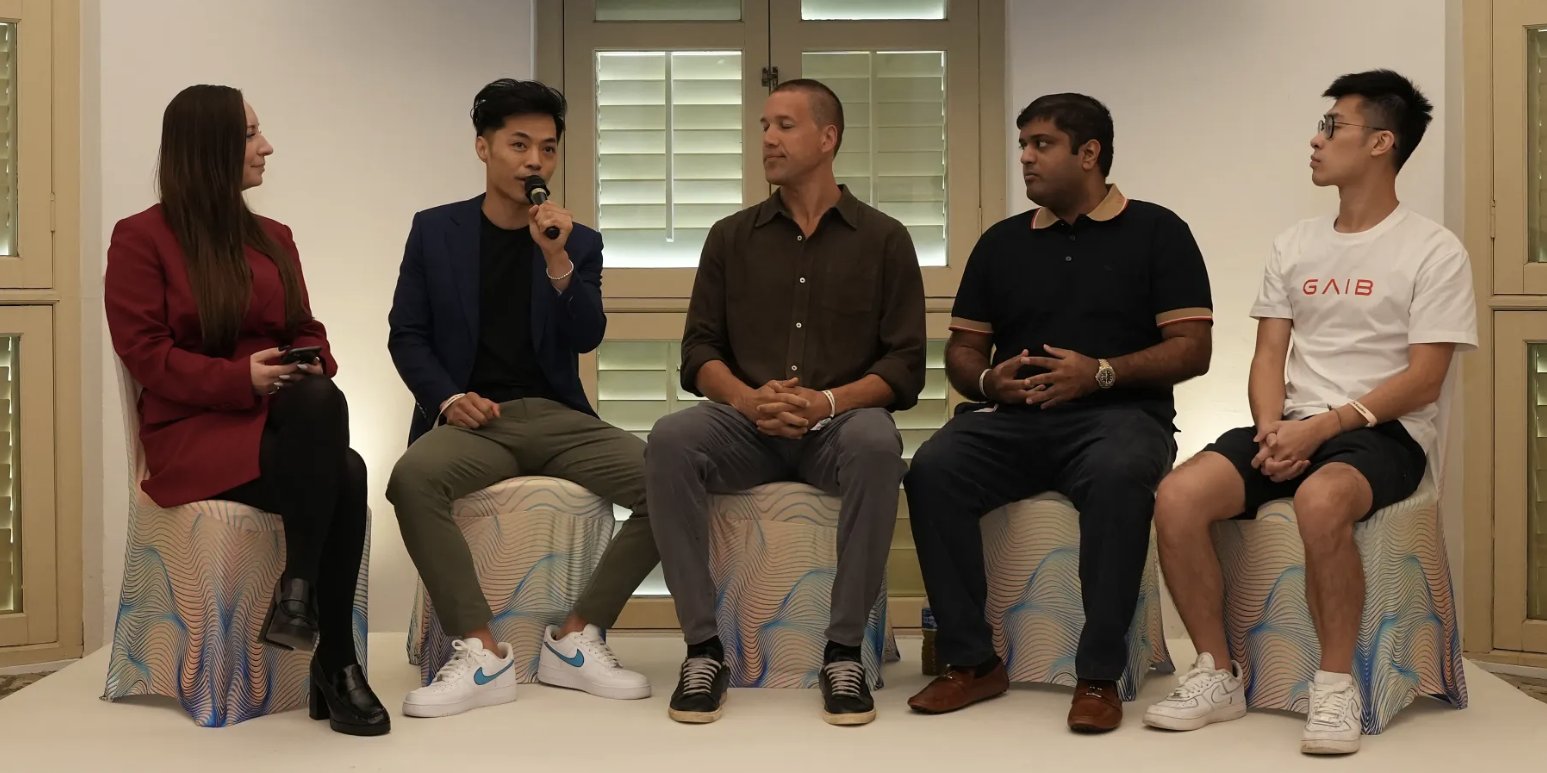
In his following keynote, Tom Ngo framed decentralization as the missing substrate for AI’s legitimacy:
“If models operate without transparent coordination, they replicate the same asymmetries that centralized finance once had. Blockchain isn’t an add-on - it’s the governance layer that lets intelligence remain plural.”
This set the tone for the next session, AI and Security: Building Trustworthy Digital Systems, moderated by Alice Liu of House of ZK.
Panelists @yq_acc (Founder @alt_layer), @FormallyJon (CEO @VeridiseInc), @leofanxiong (Founder @cysic_xyz), and @robviglione (Founder @horizenglobal & @ZKVProtocol) discussed the engineering reality behind that claim. Jon Stephens noted that traditional audits “don’t provide any formal security guarantees”, advocating continuous verification pipelines that integrate with developer workflows. YQ and Leo emphasized the need for hardware-rooted proof systems and reproducible cryptography for AI-linked smart contracts.
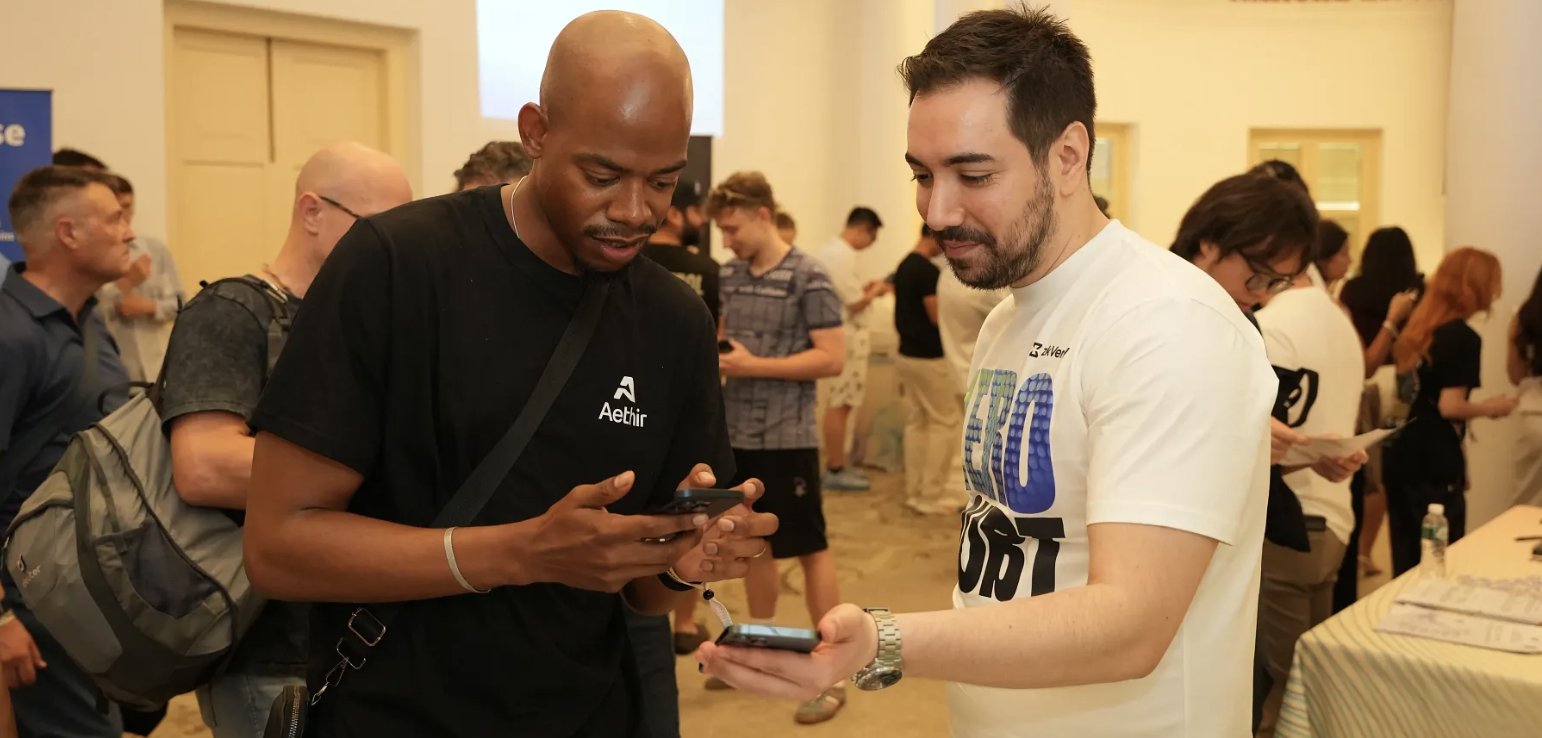
The morning closed with David Liberman’s keynote - one of the most cited talks of the day. His argument was that information is infinite but compute is scarce. AI, he said, “is pure information - copyable, frictionless - yet its execution has been captured by the scarcity of GPUs”.
Decentralization, in his view, is the only way to restore AI’s promise of universal abundance. The transition from “compute monopolies to verifiable open markets” defined a new technical and political frontier.
After a short intermission, the event shifted to the cryptographic foundation itself.
Moderated again by Evin McMullen, the panel Scaling with ZK – Proof Systems for Global Infrastructure brought together @sd_eigen (CTO @ProjectZKM), @anuragarjun (Founder @AvailProject), @no89thkey (Founder @brevis_zk), and @ssh_nkar (CEO @boundless_xyz).
Stephen explained how ZKM’s distributed proving network enables real-time proof generation, essential for systems like @GOATRollup that target live Bitcoin rollups. Arjun described Avail’s modular approach to data availability, while Michael highlighted Brevis’s direction in multi-chain composability.
Shiv contextualized it: “Proofs are becoming the API for trust. Once that layer is standardized, you can build global infrastructure on top of it.”

Following the panel, Jon Stephens elaborated on Veridise’s formal verification stack - now extending from DeFi to ZK circuits. In conversation with Alice, he identified non-deterministic circuits as the most frequent critical vulnerability across zero-knowledge systems, illustrating the necessity of deterministic formal verification before production release.
Shiv Shankar then returned to the main stage, presenting Boundless as the connective tissue across proof ecosystems - a unifying layer where zkVMs and provers could interact seamlessly. “If blockchains remain isolated, proofs stay siloed”, he said. “Boundless exists to abstract that boundary.”
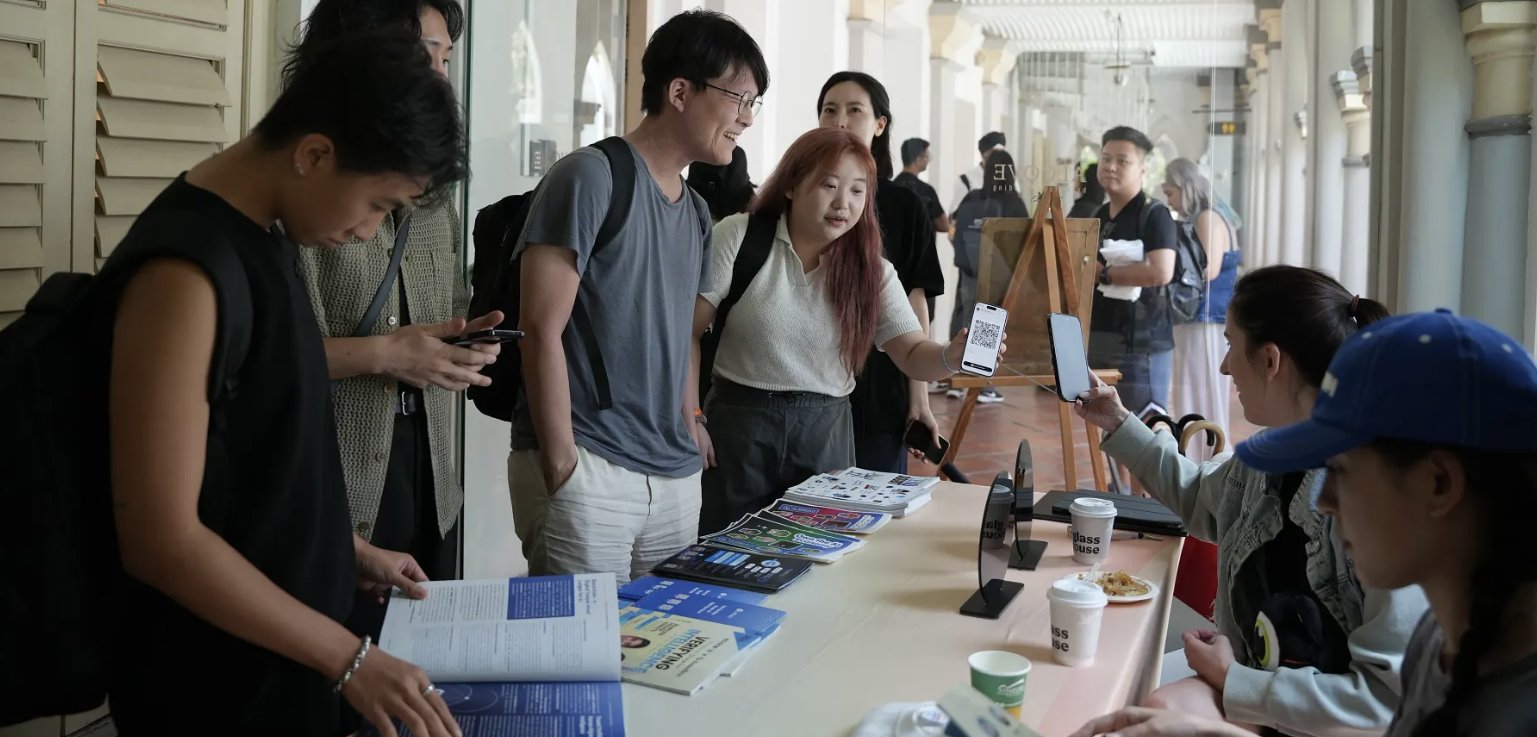
The first afternoon panel focused on ZK and Privacy - moderated by @kashviETH, Community Lead at Boundless - examined how privacy frameworks adapt to regulatory realities.
Participants Jon Stephens (CEO Veridise), @raindylu (Marketing Lead @OntologyNetwork), @stakedeve (Head of BD @aztecnetwork), and @Kate_Inco (Head of Community @inconetwork) explored technical compliance design. Steve introduced Aztec’s model of credible neutrality: the protocol itself enforces privacy, but applications can opt into selective disclosure through viewing keys and attestations. Kate described Inco’s encrypted computation primitives that allow Solidity developers to write privacy-preserving logic without new languages.
Raindy added a pragmatic note: adoption requires cultural change as much as infrastructure. “People still trade privacy for convenience”, she said. “We have to make privacy usable before it can be compliant.”
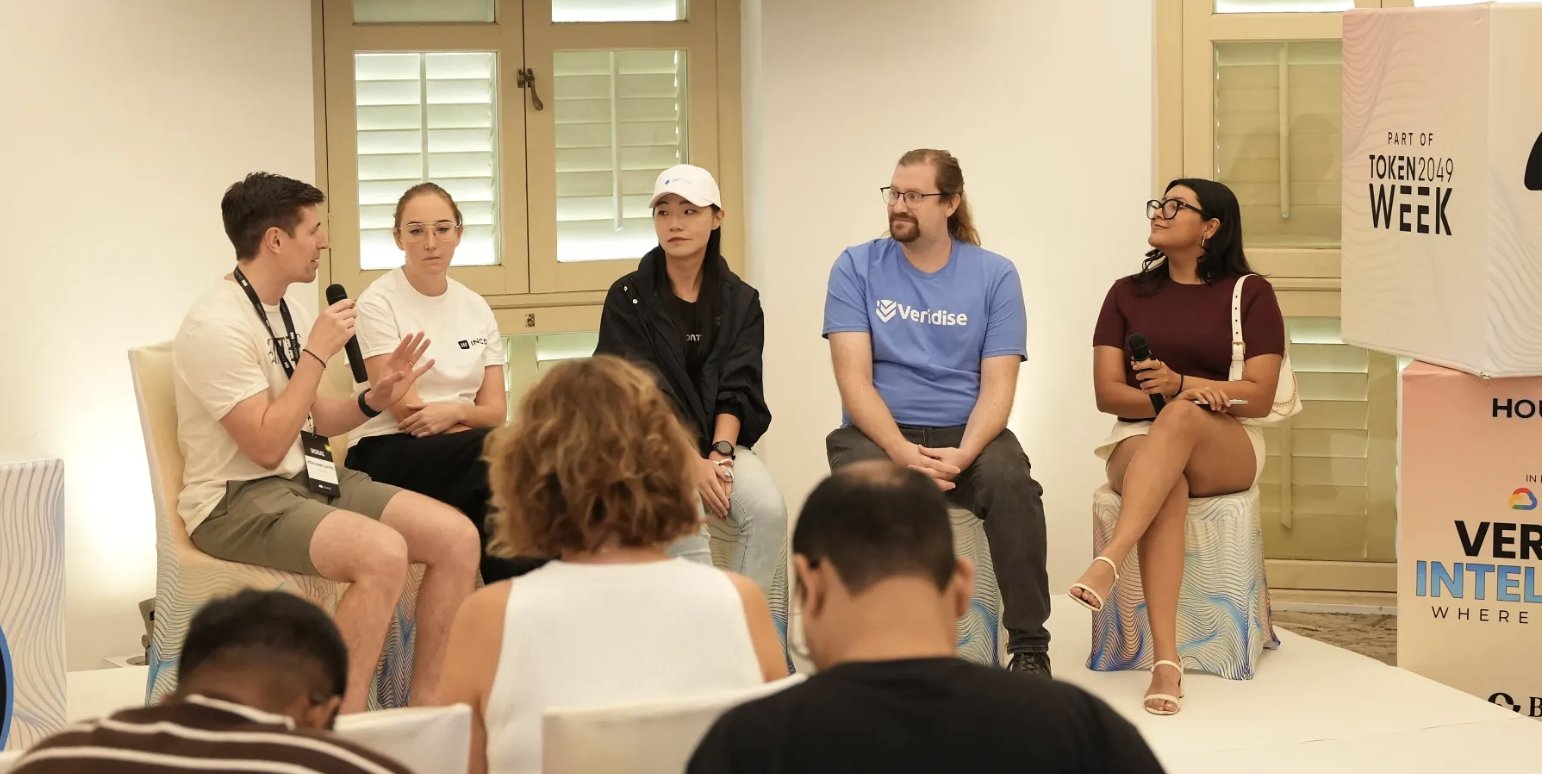
@Ismael_H_R, Founder of Lagrange, opened the ZK + AI track with one of the day’s most technical sessions. He announced that Lagrange’s DeepProve system had reached a new benchmark - the first cryptographically verifiable inference of Gemma 3, Google DeepMind’s frontier open-source LLM.
The proof covered 270 million parameters with GPU-parallelized efficiency. “For the first time”, he said, “a popular large language model can be made private and verifiable - usable in security-critical settings without trusting the operator”.
He emphasized that ZKML’s relevance extends beyond crypto: aerospace, healthcare, and defense are already investigating cryptographically secured inference.

Following Ismael's keynote, @DMSKwak sat down with Alice to outline @LazAINetwork's approach to data misalignment - the divergence between model intent and output. The company’s architecture builds composable AI agents that use blockchain incentives to ensure context-aligned behavior. “Data becomes meaningful when it’s verifiable, when it reflects genuine human context rather than synthetic averages”, he explained.
@GeoffTRichards of Ontology Network then delivered a charismatic virtual keynote combining narrative demonstration and live proof logic. His AI agent, “Bob”, interacted through zero-knowledge verifications - proving identity, financial credibility, and qualifications without revealing raw data. The performance illustrated how decentralized identity and ZK credentials could underpin trust between human and AI agents alike.
“Our agents will soon negotiate, transact, and represent us. They must be verifiable - extensions of us, not impersonations.”
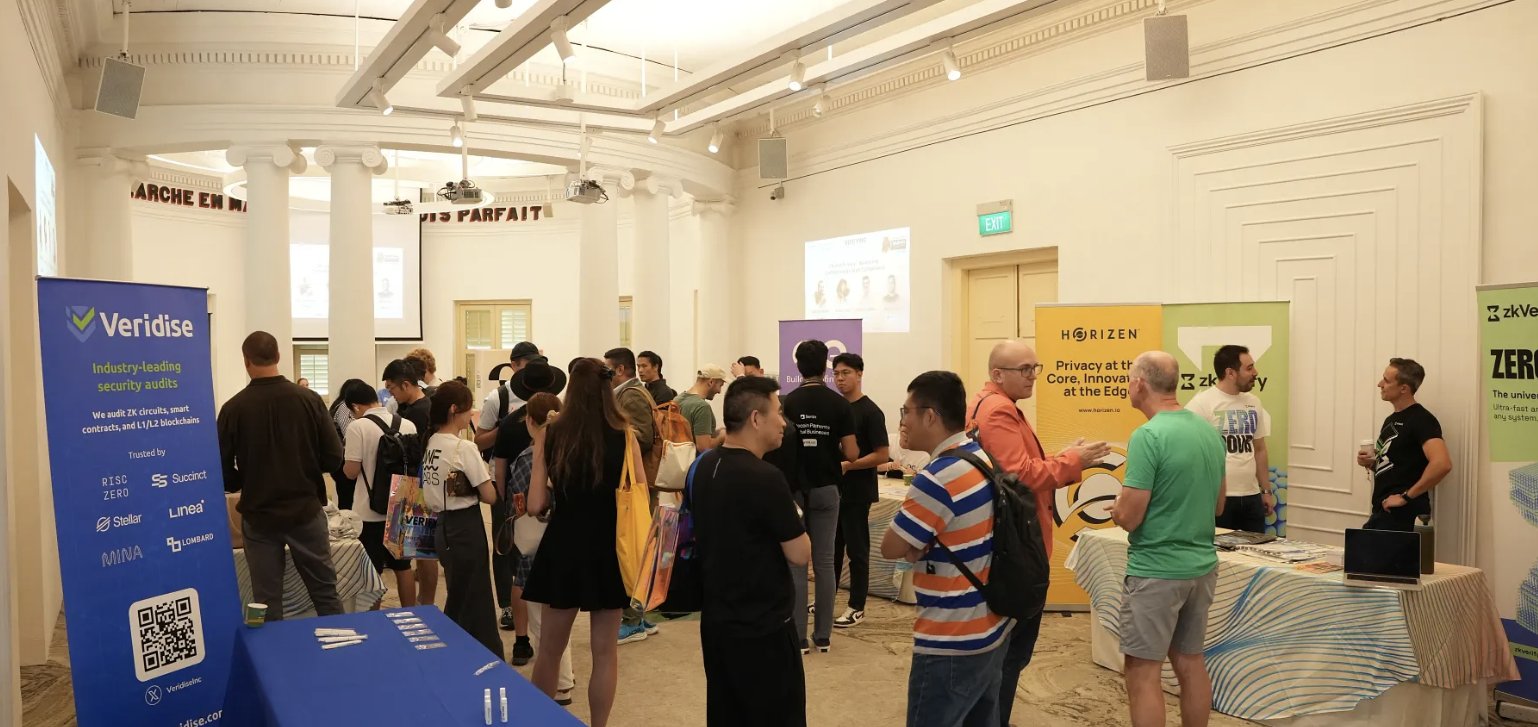
The final panel, focused on Building AI Systems We Can Trust and moderated by Alice Liu, brought together David Liberman (Gonka), Daniel Kwak (Laz AI), Ismael Hishon-Rezaizadeh (Lagrange), and Rob Viglione (zkVerify).
David framed the macro-trend: after immutable ledgers and immutable compute, “we now need immutable agents”. Systems acting autonomously on our behalf must be auditable without exposing data.
Ismael reiterated that cryptography, not policy, is the only mechanism that can mathematically guarantee correctness, while Daniel added that verifiability must be context-sensitive - not every inference needs to be proved, but critical systems do.
Rob described zkVerify’s infrastructure for handling billions of proofs at scale, enabling decentralized verification markets to sustain this new volume of machine attestations.
The session distilled a shared consensus: trust in AI cannot be post-hoc. It must be baked into the system’s cryptographic substrate.

Moving toward the end of the speaking program, Jon Stephens returned for his a keynote, introducing @AuditHubDev, Veridise’s new continuous-verification platform. He described it as an integrated environment where formal verification, fuzzing, and static analysis co-exist - turning security from an afterthought into an always-on process.
Evania Jiady of Google Cloud followed with a practical overview of Google’s startup credits and infrastructure support for Web3 founders. Her message: scalable proving and AI workloads both rely on robust cloud primitives, and Google aims to bridge that infrastructure gap.

Finally, @DacEconomy, Co-founder of ZKM, closed with perspective. He recalled ZKM’s origin as a response to @VitalikButerin’s early call for zkEVMs, and how its MIPS-based zkVM evolved into Ziren, a real-time proving system now powering Bitcoin-linked rollups such as GOAT Network. Ming Guo described how this technology now extends beyond blockchains into verifiable inference pipelines for AI - where proofs secure not only transactions but reasoning itself.
“The only thing missing is imagination,” he said. “The tools are ready. What we build next determines what intelligence means.”
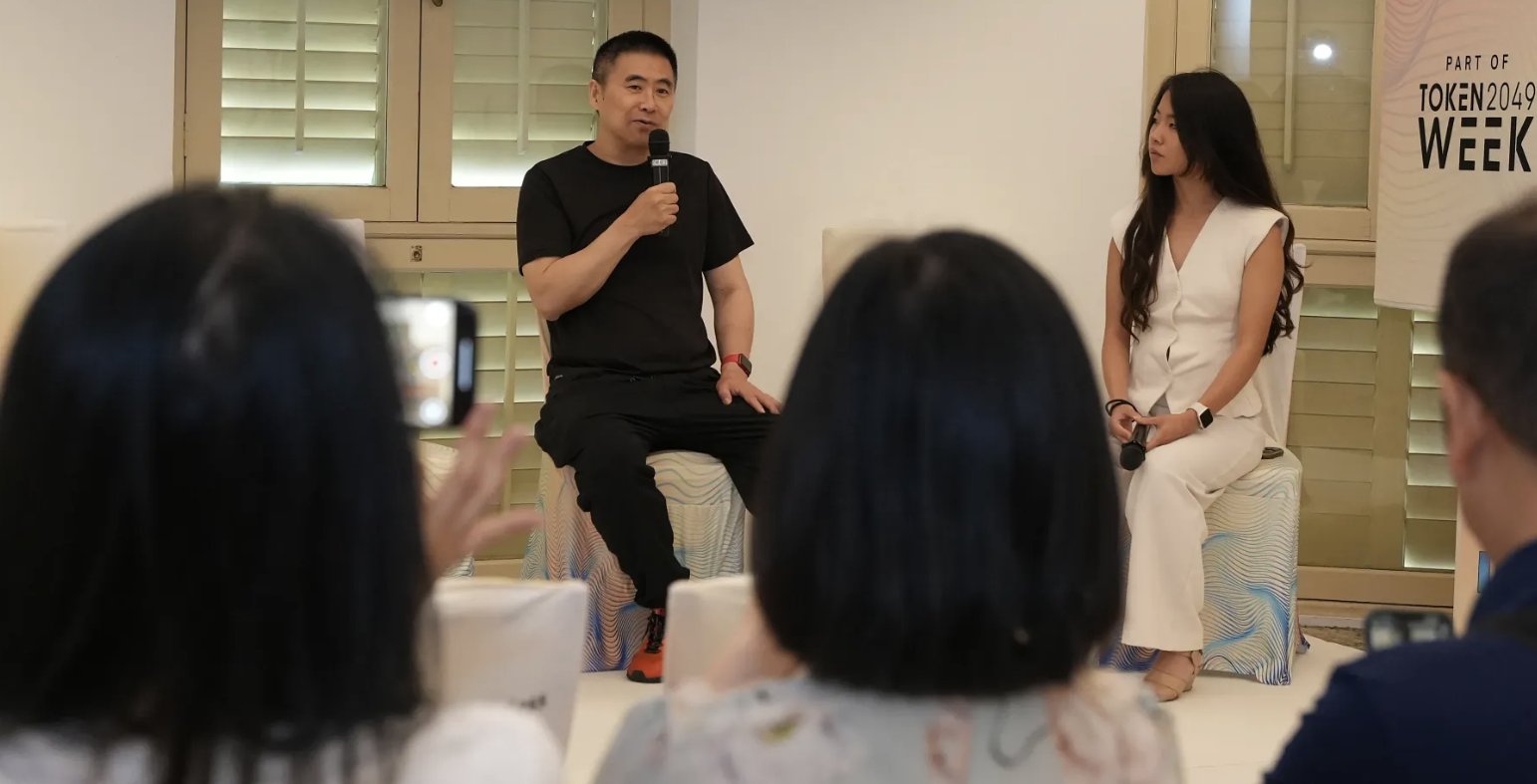
The program concluded with an exclusive networking session - a deliberate shift from structured panels to open dialogue. Builders from both the AI and ZK ecosystems gathered to exchange notes on verifiable computation, privacy infrastructure, and the day’s central thesis: proof as the foundation of digital trust.
The session also marked a milestone celebration - the mainnet launch of zkVerify, introduced earlier in the program by Rob Viglione.
As the evening progressed, conversations extended from technical implementation to shared vision - how ZK and AI might together redefine what it means for computation itself to be accountable.
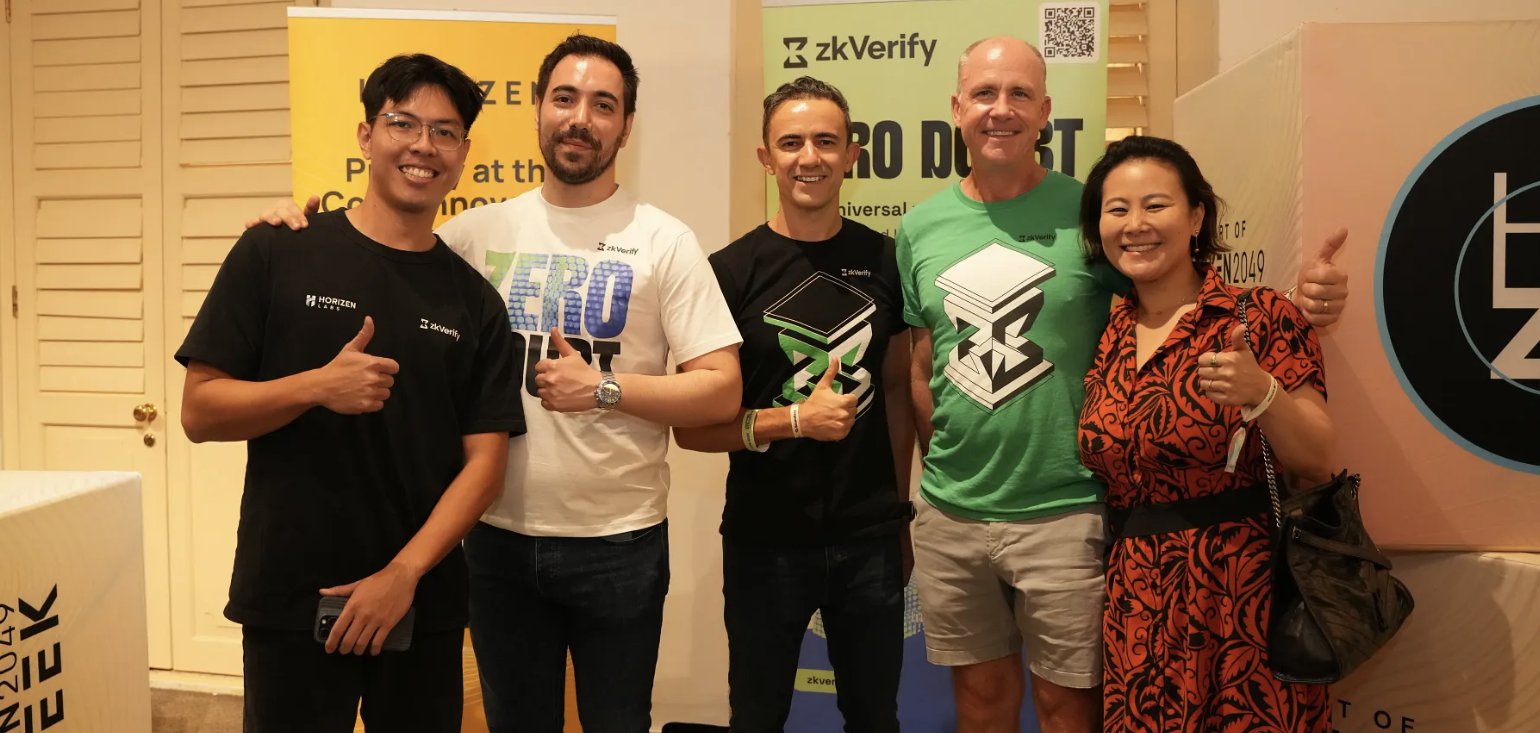
Throughout the venue, the presence of the event’s sponsors - 0G Labs, Gonka, Altlayer, Veridise, Ontology, and Laz AI - created a tangible sense of ecosystem maturity. Each hosted dedicated booths showcasing live demos, open-source contributions, and in-progress research around verifiable computation and AI infrastructure. Attendees circulated between panels collecting limited-edition merchandise, project literature, and a printed edition of the House of ZK Magazine, which featured in-depth articles on the intersection of zero-knowledge and artificial intelligence.
For those who missed it, the digital version of the magazine is available at https://www.hozk.io/magazine
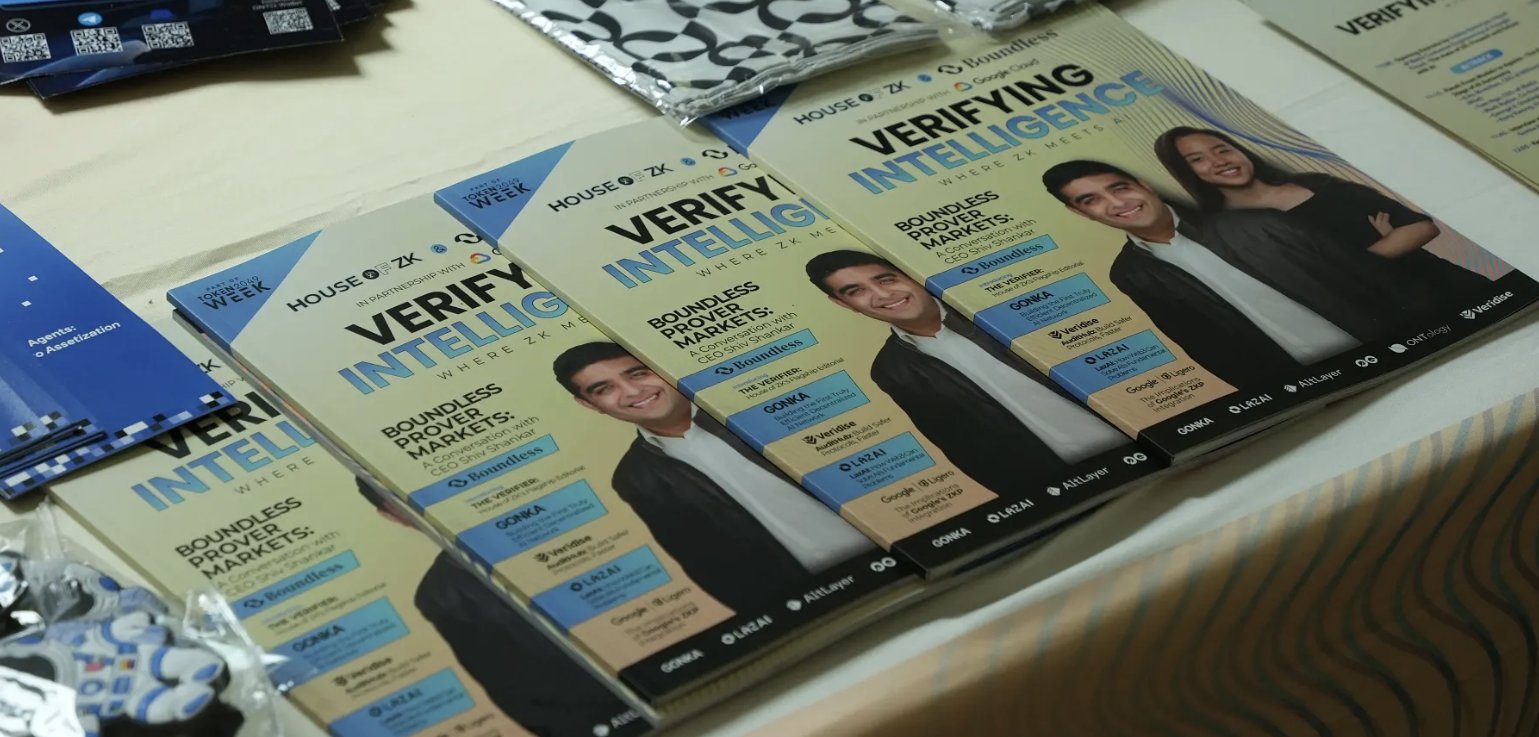
Running parallel to the main program were a series of Whitepaper Reading Club sessions - a recurring component of House of ZK events curated by @WPReadingClub's @mrrongxin. These small-format gatherings invited participants to dissect foundational research papers in real time, bridging the academic and applied sides of zero-knowledge technology. The discussions focused on verifiable AI frameworks, zkVM architectures, and new proof-market primitives, offering a rare chance for attendees to deepen their understanding alongside peers and researchers.
The reading sessions have become one of the most consistently praised elements of House of ZK programming - a space where complex theory meets collaborative learning.
By evening, it was clear Verifying Intelligence had not been another conference about hype cycles. It was a forum for convergence - where Boundless framed interoperability, Google Cloud provided infrastructure, and House of ZK articulated the cultural question underlying both cryptography and AI: when intelligence becomes autonomous, what anchors truth?
Across every track, that answer pointed back to verifiability - the ability to prove, not claim. Whether ensuring fairness in AI outputs, privacy in digital identity, or correctness in ZK circuits, the same foundation reappears: proofs as the language of trust.
Verifying Intelligence concluded with that conviction - that the next era of computation will not only think and act, but prove why it should be trusted.
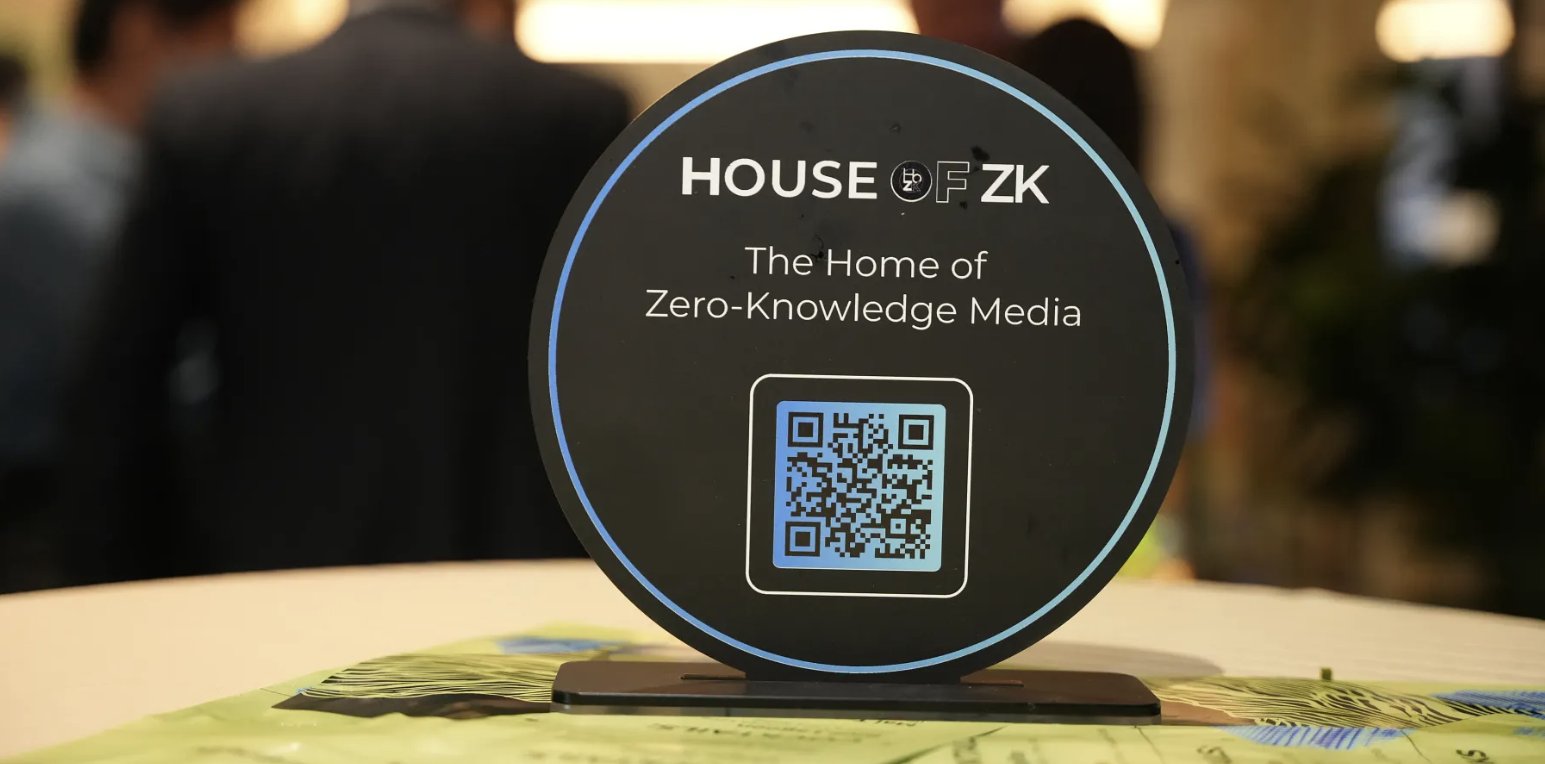
Look out for information on our upcoming events at: https://www.hozk.io/events